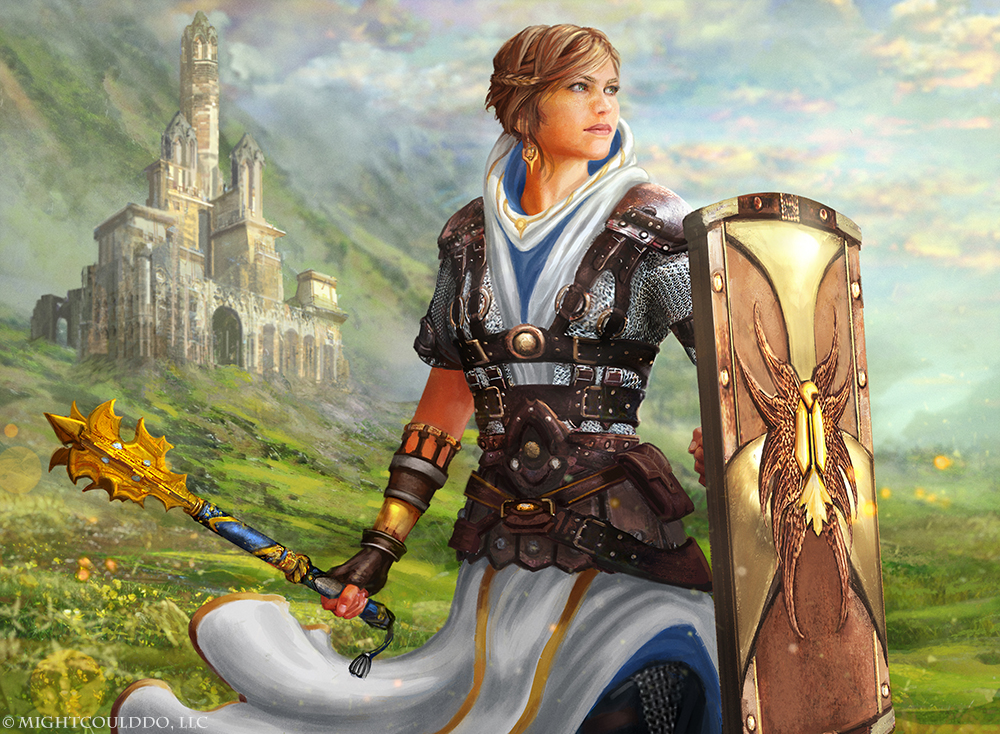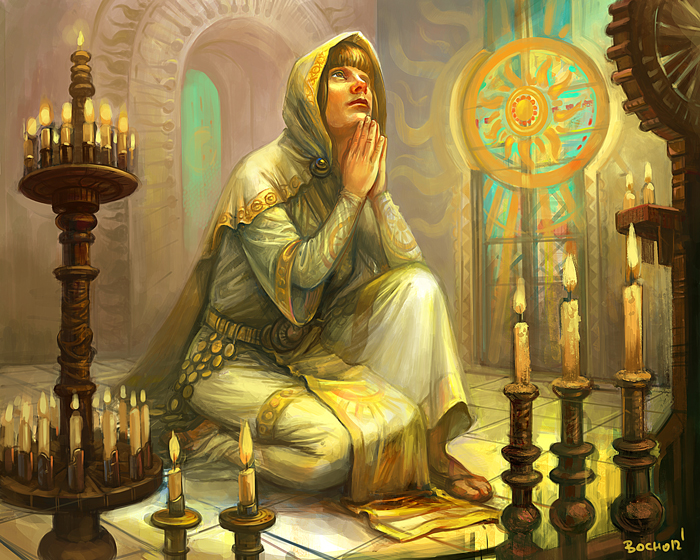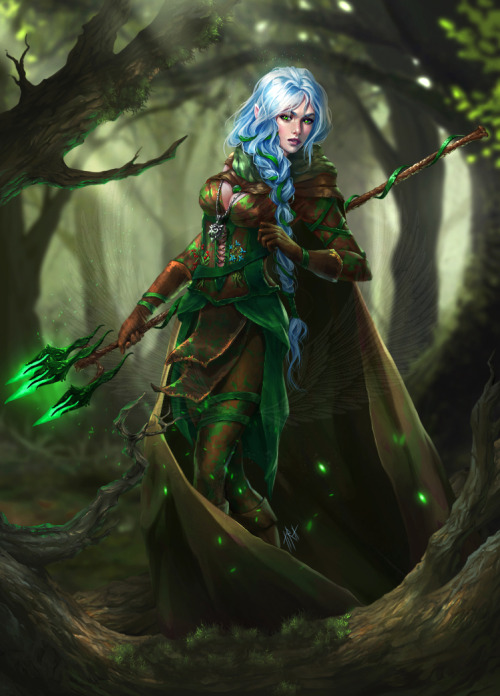Today's post is a partial response to the above video made by "Black Belt Games". If you haven't seen it, I encourage you to watch it and the two other parts to the series. It's a discussion about the Advanced Dungeons & Dragons 1E classic feel, and how that contrasts to many modern RPGs (including modern D&D).

Classic Style Dungeon Crawling
In the video there is talk about the methodologies used to negotiate a dungeon back in the 1980s. Specifically, how players often had to rely upon their own wits, common sense and attention to detail (to the GM's descriptions of both room, scenarios and circumstances) to avoid traps, ambushes, solve puzzles and otherwise get into a dungeon, loot it of treasure, and survive on the way out.
This, as the video says, is a very different approached compared to the emphasis, encouragements and negligence of modern tabletop gaming. Today's players often have what has been called "Heads Down Syndrome"; which is to say that whenever a problem is presented to a band of adventurers, every player looks down at their character sheet to figure out which skill, feat, spell, etc. they can evoke to solve the problem. The entire affair of navigating a labyrinthine dungeon of horrors has been reduced to a simple act of "hunt and peck" for the best superpower that suits the problem. This is akin to having a toolbox full of tools, and your three hour game session boils down to being presented different scenarios and your only job is to find the right tool.
In classic gaming, and that of the Old School Renaissance (OSR) community, YOU--the player--had to out-think the problems you were presented. The tools you had at your disposal were whatever your character was physically capable of doing, as well as whatever equipment your character was carrying on their back.
Characters were no super heroes out of the gate. They were mortal men and women who were very squishy and often times met an untimely demise (sometimes early into the adventure). This in turn encouraged players to handle their characters more cautiously. No smashing down doors without first considering the noise it'll create in a cramped dungeon; and whose ears may be alerted to your presence. Traps were a constant fear, and the seemingly-now-extinct tricks would play with player's minds.
If you've ever played the game "Dungeon Quest", you'll understand the sentiment I'm trying to convey. It's a parallel solitaire boardgame of players-versus-the-game style where you are an adventurer trying to get to the center of a dungeon, rob a sleeping dragon of its riches, and get back out before sundown. The challenge is hinted at when the rulebook states there's only about a 20% survival rate. What other boardgame have you played has proudly stated such a steep difficulty? It immediately sets a mood "survivalism" and adds tension and excitement to the play session.
Skills Systems
In OD&D, BD&D and AD&D 1E there were no such things as "skills". No skill checks, no +1 to falconry or anything like that. The logic was that if your character attempted to do something extraordinary, they would simply roll 1d20 and hope they rolled under their score ("Roll Under for Achievement"--RUNA). The six attributes (strength, intelligence, dexterity, constitution, charisma and wisdom) were broad enough and generic enough that they could (theoretically) cover 80%+ of the situations you had to roll for. I've always found these six attributes genius, really. They were perfectly balance; not too generic but not too limiting.
Yet in 2E and on we begin to see the introduction of skills. Even Rules Cyclopedia introduced optional rules for a skill system. The idea was that characters could have a base score for their six attributes, but then excel in certain fields of study, or perform poorly in other fields, in some cases. To me, the introduction of skills was genius. It allowed players to further flesh out and express their characters. It allowed characters to be more individual.


Yet, as often happens, sometimes there is too much of a good thing. As Wizards of the Coast bought the Dungeons & Dragons intellectual property from TSR, we then saw tons and tons of skills, and even more bonuses, feats and so forth. I call this transition the "death of a thousand +1's". The ability to mix and match various bonuses, spells, feats, skills and so forth caused huge swings in balance. The traditionally physically weak wizard could suddenly negate their weakness with feats, and amplify their spells to ridiculous heights; which in turn caused an arms-race between the classes, in an attempt to keep up.
So it should be no surprise that in today's age many people of the OSR community reject skills, almost on principle, because of what it has lead to. But what if there was a better way? A compromise?
Let's start by throwing out the skill tables/lists. Every RPG tries to come up with their own unique list of skills that the designer thinks the players will need in their adventures; depending on the genre of the game. However, we've all been ignoring the gorilla in the room: if skills are based off the type of action, then there are literally tens of thousands (if not unlimited) potential skills a player character could engage in. Trying to cover every conceivable action is ignoring the genius that Gygax gave us: the generic "six attributes" cover most of what we need. So, we need to adopt a "one size fits all" model, rather than a "1,001 skills" model.


Let's imagine that every player started with a number of "skill points" equal to their intelligence. There are no defined skills in the rulebook. Instead, players are encouraged to "make up" their own skills based off what they want their character to know, instead of what the game designer thinks they want them to know. For example, if I was making a burglar and I have 10 skill points to allocate, I could choose to place them like so:
- Lock Pick: +2
- Hide Motive: +5
- Climb: +3
In my mind, I want my character to pick out victims he'll steal from, then talk with them under the guise of becoming their friend. In truth he'd be fishing for information to determine if they're wealthy, and if so, where they live and any security measures he should be aware of before robbing their house.
Because this example skill system is amorphous, I was able to tailor my character exactly how I wanted, rather than being pigeon-holed into a preset. That's not to say that you can't provide example skills for players who enjoy the "pick and go" method to character creation.
Professions
One mantra the OSR community likes to parade is more narrative freedom and emphasis on GM fiat and player character expression. The idea being that there should be more immersion within the game; and less about preset superpowers or getting lost in the complex rules. This sometimes is expressed as a "roll-playing versus role-playing" argument.
One aspect I'd like to see expanded is a character's background; specifically that of their profession. Where did your character come from, and what trade did they take up prior to adventuring? What skills did their trade teach them? Why did they take up that trade? Answering these questions is a great way to develop a personality for your character and better understand the hardships (and growth opportunities) they experienced in their past.


Many modern RPGs treat professions similar to that of skills. Game designers try to come up with a list of professions they think the players will want to play, throw handfuls of +1 modifiers at the previously mentioned skill list/table in a way that they think best suits that profession, then call it a day. For example, a game designer might determine that a "ranger" profession pivots off the idea of having an animal familiar, and so states that all rangers get a +2 to animal handling.
The problem will all of this is the same as that of skills: there are literally thousands of professions out there, and the multitude of skillsets required to operate effectively within each of those professions can differ dramatically. Game designers are faced with a fork in the road:
- Create a massive compendium of 1,001 professions that covers as much as humanly possible
- Create a paired down table that covers a few core professions that is subject to the designer's own biases/preferences
- Ignore the whole problem and don't have support professions or hand wave it away
But what if there was another way? Something akin to the skills system laid out above. What if we had the audacity to let the players "make up" their own professions? Would the world end? No, I don't think so. So long as we say that players can choose any profession/background for their players but every part is subject to the GM's approval, I think we'll be fine.
This "virtual profession" system opens the flood gates to countless job titles that we don't typically see in RPGs. Instead of being a "fighter", suddenly you could be a "baker" or a "fletcher" or "artisan". The real question is, how would this self-proclaimed profession affect the in-game mechanics? For that, we turn to our next point.
Advantage/Disadvantage System
One of the best things that came out of fifth edition Dungeons & Dragons, in my opinion, was the "advantage/disadvantage" system. The premise is so simple, yet can be used in a wide range of areas. If your character has advantage in something, you can roll twice and take the better roll. Disadvantage was simply the opposite: roll twice and take the worse of the two rolls. Genius.


We can take this simple, yet "modern" system and apply it to our professions and skills system. Here's how (this may come off as a bit controversial and bold):
Rule 1: Anytime you would perform a skill test, you must perform it with disadvantage.
I don't know about you, but to me that's a pretty sweeping rule. It sounds kinda dumb, too, at first glance. Every single time I want to pick a lock, climb a cliff or bargain over the price of an item, my character has disadvantage? Why? Here's why.
If your character was a warrior for many years, it is reasonable to assume that they are good at all things warrior-related. They're good with a sword, battlefield tactics, command structure and so on. But if a character attempted to perform an action they've never done in their life (e.g. the warrior attempts to dance), they're naturally going to suck at it. But if it's an action they've done many times professionally, or because they're naturally skilled in it, they wouldn't suck (aka wouldn't have disadvantage). So, performing all actions with disadvantage is another way of saying "As beginners, we all suck the first time." so all actions we perform start with disadvantage. To complete this train of thought, we need a second rule:
Rule 2: If your character attempts to perform an action that would fall within the responsibilities of their profession, or they have one or more positive modifiers (e.g. "+1") in that skill, they can perform that skill test as normal (without disadvantage).
Let's imagine that warrior, who is used to forced-marches, battling foes on the battlefield, and sleeping in military encampments, suddenly finds himself deep in a dungeon and wanting to climb down a sheer cliff face. The GM could make a call that "rock climbing" is not in the job description of a warrior, nor did the player choose to put any of their skill points into such a skill, therefore if they do choose to climb down the cliff they will do so with disadvantage.

At this point I want to take a moment and discuss what the implications are for such a set of rules. What would you, the player in charge of this warrior, think knowing their life hangs on a climb test with disadvantage? How would you react? My guess is your reaction falls somewhere within one of these possibilities:
- Discouragement: You think "gee, on second thought climbing down this cliff looks dangerous and I don't really know anything about rock climbing. I better not."
- Teamwork: You think "gee, on second thought climbing down this cliff looks dangerous and I don't really know anything about rock climbing. I better let the rogue do it since it is actually something he does professionally."
- Inspiration: You think "gee, on second thought climbing down this cliff looks dangerous and I don't really know anything about rock climbing. I better get out some rope."
Of course it is possible you might think "this sucks" and attempt to flip the gaming table over in a fit of rage, but I hope cooler heads prevail. Anyway, I want to talk about each of these points individually.
In the first reaction (discouragement) we have a dangerous situation that forces the player to play more cautiously, and to second guess their decisions. This is the exact style of play the above video was talking about when they described the "feel" of AD&D 1E. We want things to be hard. We want things to be deadly. We want the characters to fear for their lives and stay close to their strong points.
In the second reaction (teamwork) we have what I call a "soft class limit", which is different than a "hard class limit". To better explain what I mean, I'll tell you of something that happened to my fighter character last night, during my weekly AD&D 1E session:
[My fighter and his allies were climbing the stairs leading to the top of a pyramid.]
Me: "As I climb the stairs on the right-side, I want to look carefully at each ledge to see if I notice any foot prints or other sign of recently activity."
GM: "Are you a ranger?"
Me: "No..."
GM: "You see nothing."I couldn't help but chuckle when the GM said this. However, my initial reaction was both a positive and negative one. Negative because I felt like it was unfair for my character to insta-fail at attempting a task simply because I was not a ranger. This is what I call a "hard limit" to a class. Because I wasn't a ranger, I had no chance of succeeding at tracking.
However, I also had a positive reaction: I was obviously attempting to do something outside my expertise, and the GM was reminding me to color within the lines, or, put another way, "play your class/role".
The balance between these two reaction is to have limits, yes, but not make them so glaringly black and white. Make the limits "soft". We can encourage teamwork between players by giving everyone a role to play. If you're a fighter, you knock heads. A thief "knows things". A magic user casts magic. But characters should still be able to attempt any "skill", it's just that if they try to do something that isn't within their profession, they get disadvantage. Success is still possible, just far less likely.
The last reaction (inspiration) is all about using an obstacle or problem to foster creativity. Specifically, through dungoneering equipment.
Equipment
In the video, the narrator mentioned how in old-school RPGs, players would spend considerable time carefully picking out the necessary equipment needed to travel overland, enter a dangerous dungeon, cave, catacomb or castle, loot it of its treasure and return home safely. In a way, equipment was the original "skill system". The idea being that equipment was used to augment or enhance character capabilities. In modern RPGs players choose a bunch of skills and gloss over equipment. But back in the day, however, skills didn't exist and players picked spent time choosing equipment.
Equipment, and resource management, should play an important role in any adventure. But in today's age it's hard to convince players of the importance of equipment because it's often difficult to quantify its importance. We can say that equipment does one or more of the following:
- Opportunity: Some actions, without the necessary equipment, simply cannot be done. For example, one cannot pick a lock without a lock pick kit (or home-made equivalent). Therefore, much equipment simply affords characters the opportunity to do something otherwise impossible.
- Value: Of course equipment has a price, or a value associated with it. Treasure is a great example where it has no utility function; it's simply there to be sold for money.
- Enhancement: Some actions can be performed without equipment, but by using equipment, it greatly increases your convenience or chances for success. A rope used while climbing down a sheer cliff is there to help you, though you could attempt to do it without such an aid.
Rule 3: If a character attempts an action that can be performed without equipment, but uses equipment to aid them, they may perform that action normally (without disadvantage).

With this rule, we can provide a universal value to all equipment. Characters are encouraged to buy and use various gear because it will offset the default disadvantage most everyone has to suffer when performing an action outside of their comfort zone. Players will be less likely to skip through the equipment acquisition step of character creation. They can compare their character's strengths to that of the opportunities and enhancements provided by their accessories.
Conclusion
To tap into the spirit of classic gaming, we don't need to be super-specific like modern RPGs are today. We can have broad-reaching professions that provide a fast-and-simple advantage system. We can also use the popular skill modifiers that are in literally every RPG made today, but tone down the complexity and tailor it as an expression of our character's background and personality. Lastly, we can bring back the important of expedition equipment by giving players a small treat for using it.











